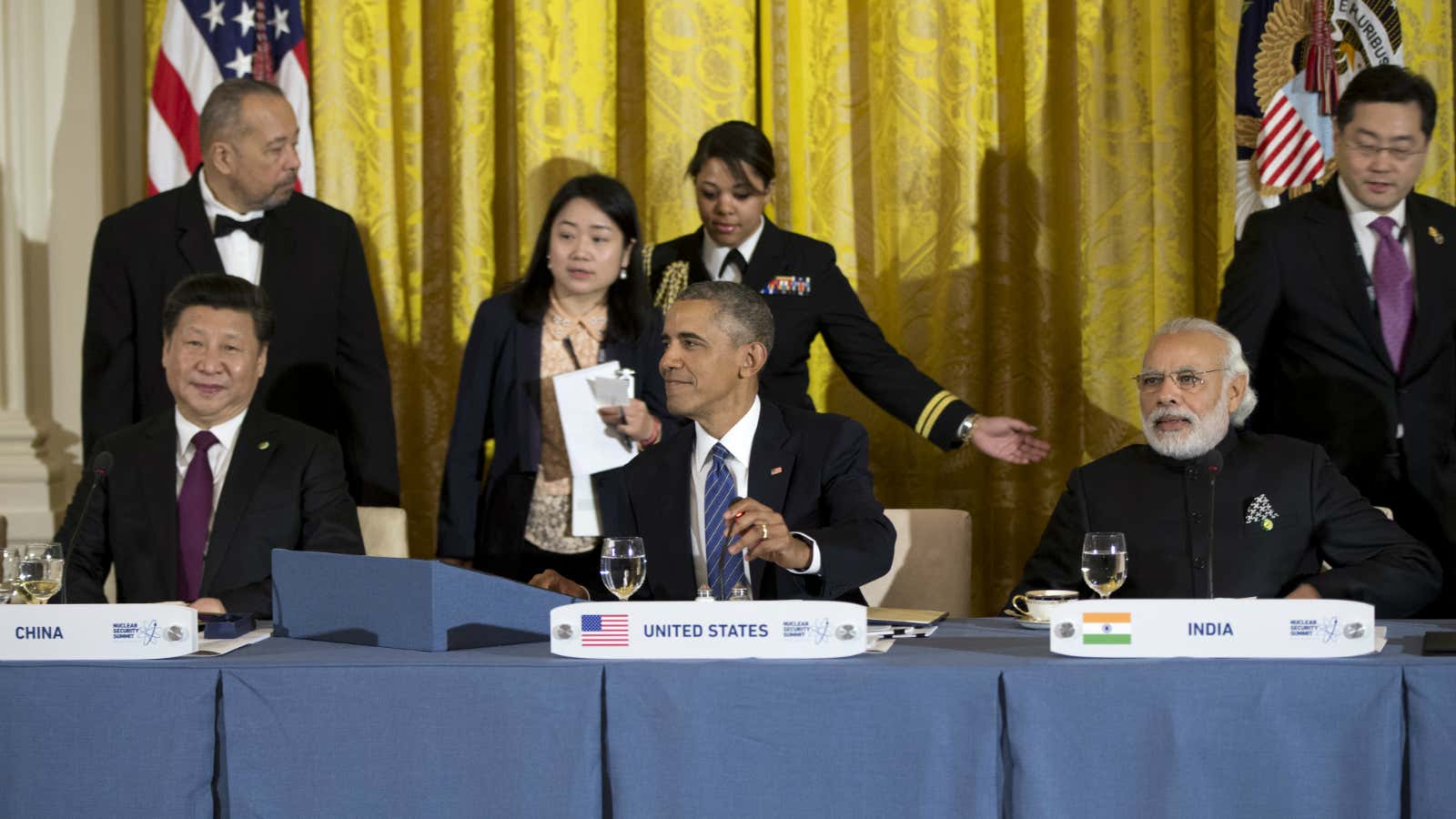Even after eight years of lobbying for a seat at the Nuclear Suppliers Group (NSG), India’s wait continues.
At a special NSG session over the past two days in Seoul, India’s application for membership was discussed. But with as many as six countries opposing its entry, on the grounds that India is yet to sign the Non-Proliferation Treaty (NPT) and the Comprehensive Test Ban Treaty, the gates remained closed for India, at least for now.
A seat at the NSG is crucial for India because this exclusive group of 48 countries controls the global trade in nuclear technology. Although India already has a waiver that gives it access to the global commercial nuclear trade and technology, this membership would have helped it assert itself as a legitimate nuclear state.
“The NSG had discussions on the issue of technical, legal and political aspects of the participation of non-NPT states in the NSG, and decided to continue its discussion,” a statement from the NSG said.
It reiterated that India will have to sign the NPT if it wants to join NSG in future. ”Participating governments reiterated their firm support for the full, complete, and effective implementation of the NPT as the cornerstone of the international non-proliferation regime,” the statement said.
Although India found support from countries such as the US, the UK, France, and Russia, it wasn’t enough. Opposition to India’s entry came from countries, such as Norway, New Zealand, South Africa, Brazil, and China. While Brazil wasn’t entirely opposed, it insisted on discussing “process” and “rules,” NDTV reported.
But the most vocal opponent to India’s entry was China, which insisted that any concession extended to India must apply to its nuclear-armed neighbour Pakistan, which, too, has sought NSG membership. The NSG is a consensus-based group and decisions are always taken unanimously.
“We understand that despite procedural hurdles persistently raised by one country, a three-hour long discussion took place last night on the issue of future participation in the NSG,” a spokesperson for India’s foreign affairs ministry said, making a clear reference to China’s position.
“An overwhelming number of those who took the floor supported India’s membership and appraised India’s application positively,” the statement added. India also maintained that its “participation in the NSG will further strengthen nuclear non-proliferation and make global nuclear commerce more secure.”
All members don’t agree with India’s argument.
“Some countries do want to set a precedent for non-NPT countries to be members,” said Christine Fair, an associate professor at Georgetown University. “After all, this is supposed to be one of the perks of NPT membership.”
“Second, there are strategic interests that India’s ability to acquire materials for its domestic nuclear program from the international market will free up India’s domestic resources for its weapons system. While China and Pakistan will fear this, this is precisely why the United States wants India to be mainstreamed,” Fair added.
China’s opposition probably stems from the fact that India’s entry into NSG could change South Asian geopolitics.
“The other reason, which really applies only to China, is that letting India in would have deleterious geopolitical impacts. Specifically, for China, letting in India would mean its chief strategic rival would be on an equal footing in this prestigious club,” Michael Kugelman, senior associate for south and southeast Asia at Woodrow Wilson International Centre for Scholars had earlier told Quartz.
In the run up to the meetings, India has aggressively lobbied member countries. Earlier this month, Indian prime minister Narendra Modi visited Mexico and Switzerland—two countries that had earlier raised concerns—to seek their support.
On June 23, in a bid to convince Beijing, India’s staunchest opponent, Modi even met with Chinese president Xi Jinping for over 45 minutes in Tashkent, Uzbekistan. The meeting was held on the sidelines of the Shanghai Cooperation Organisation (SCO) summit. Modi reportedly asked Xi for a “fair and objective assessment” of India’s bid for a seat at the NSG.
India had also put its best diplomats on the mission in Seoul, including the country’s foreign secretary, S Jaishankar, an expert in nuclear issues and former ambassador to the US and China. Amandeep Singh Gill, who had earlier negotiated the details of India’s civil nuclear agreements, was also part of the crack diplomatic team that camped in the South Korean capital.
Yet, clearly, there is still much work left to do.
